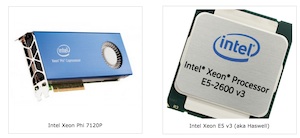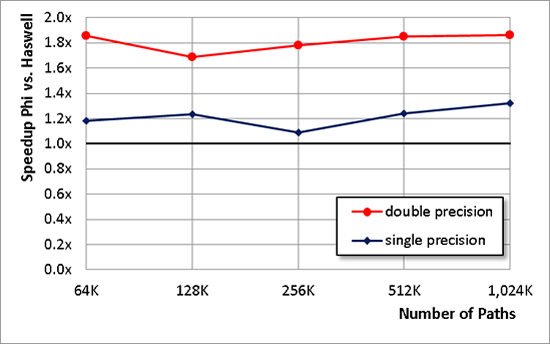 Over at the Xcelerit Blog, Jörg Lotze benchmarks Intel’s new Haswell (Xeon E5 v3 series) against the company’s flagship Xeon Phi coprocessor using a popular computational finance code. As the test application, he use a Monte-Carlo simulation used to price a portfolio of LIBOR swaptions.
Over at the Xcelerit Blog, Jörg Lotze benchmarks Intel’s new Haswell (Xeon E5 v3 series) against the company’s flagship Xeon Phi coprocessor using a popular computational finance code. As the test application, he use a Monte-Carlo simulation used to price a portfolio of LIBOR swaptions.
The Xeon Phi accelerator wins the race clearly for double precision, reaching around 1.8x speedup vs. the Haswell CPU. However, this drops to 1.2x in single precision. The main reason is that the single precision version requires only half the memory and hence makes better use of the cache. The Haswell CPU has more cache and a higher cache bandwidth, which decreases the performance advantage of the Xeon Phi. While this is an overall win for the Xeon Phi, taking into account that typical servers are configured with two CPUs would reverse this result. Furthermore, a less than 2x performance improvement often doesn’t justify the move to a hardware accelerator in practice (i.e. Xeon Phi or GPUs). However, one should keep in mind that the key benefit of accelerator processors is that high-density server configurations can combine four or more accelerators. Combined with conventional CPUs and the right software, this can deliver quite spectacular performance.
Lotz notes that the test application is considered to be a good fit for both processor types. Your mileage may vary.
Read the Full Story.
Sign up for our insideHPC Newsletter.




